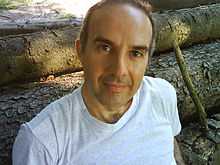Eduardo Zorita

Eduardo Zorita (born in Madrid, 1961) is a Spanish paleoclimatologist. He is presently (2010) a Senior Scientist at the Institute for Coastal Research , GKSS Research Centre in Geesthacht, Germany, where he has worked since 1996. Zorita was a contributing author to the Fourth Assessment Report of the IPCC, and is review editor of the journal Climate Research.
Zorita received his Ph.D in solid state physics at the University of Zaragoza in 1988, and then held a postdoctoral appointment at the Max Planck Institute for Meteorology , Hamburg. He was an Associate Researcher at the Laboratoire de Océanographie Dynamique et de Climatologie (LOCEAN), Pierre-and-Marie-Curie University, Paris, 1994–95.
Zorita is a regular contributor to Die Klimazwiebel, a climate science blog operated by Hans von Storch, Zorita and other climate scientists.
Views on the Climategate controversy
Zorita was quoted in the Wall Street Journal as saying that the "scientific debate [on climate change] has been in many instances hijacked to advance other agendas", and that climate science students are "often tempted to tweak their data so as to fit the 'politically correct picture'. " Zorita continued, "some, or many issues, about climate change are still not well known. Policy makers should be aware of the attempts to hide these uncertainties ...".[1]
Selected publications
- Frank, D.; Esper, J.; Zorita, E.; Wilson, R. (2010). "A noodle, hockey stick, and spaghetti plate: A perspective on high-resolution paleoclimatology". Wiley Interdisciplinary Reviews: Climate Change 1 (4): 507. doi:10.1002/wcc.53.
- Zorita, E. (2010). "European temperature records of the past five centuries based on documentary/instrumental information compared to climate simulations". Climate Change 101: 143. doi:10.1007/s10584-010-9824-7.
- González-Rouco, J. F.; Beltrami, H.; Zorita, E.; Stevens, M. B. (2009). "Borehole climatology: A discussion based on contributions from climate modeling". Climate of the Past 5: 97. doi:10.5194/cp-5-97-2009.
- Zorita, E.; Stocker, T. F.; von Storch, H. (2008). "How unusual is the recent series of warm years?". Geophysical Research Letters 35 (24). Bibcode:2008GeoRL..3524706Z. doi:10.1029/2008GL036228. Lay summary – Science Daily (10 January 2009).
- von Storch, H.; Zorita, E. (3 May 2007). "The decay of the hockey stick". Climate Feedback. Nature Climate Change.
- von Storch, H.; Zorita, E.; Jones, J. M.; Dimitriev, Y.; González-Rouco, F.; Tett, S. F. (2004). "Reconstructing past climate from noisy data". Science 306 (5696): 679–682. Bibcode:2004Sci...306..679V. doi:10.1126/science.1096109. PMID 15459344.
- Zorita, E.; von Storch, H. (1999). "The Analog Method as a Simple Statistical Downscaling Technique: Comparison with More Complicated Methods". Journal of Climate 12 (8): 2474. Bibcode:1999JCli...12.2474Z. doi:10.1175/1520-0442(1999)012<2474:TAMAAS>2.0.CO;2.
- von Storch, H.; Zorita, E.; Cubasch, U. (1993). "Downscaling of Global Climate Change Estimates to Regional Scales: An Application to Iberian Rainfall in Wintertime". Journal of Climate 6 (6): 1161. Bibcode:1993JCli....6.1161V. doi:10.1175/1520-0442(1993)006<1161:DOGCCE>2.0.CO;2.
See also
References
- ↑ Eduardo Zorita on the politics of climate science. "Notable & Quotable", Wall Street Journal, December 5, 2009. "Eduardo Zorita, a climate scientist at Germany's GKSS Research Center, writing on his personal Web site about the Climategate email scandal."
Sources and external links
- Eduardo Zorita's home page at the Institute for Coastal Research
- Die Klimazwiebel blog
- Zorita's Photostream at Flickr